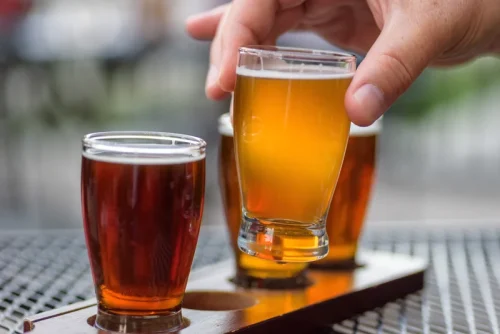
Hydrocodone without acetaminophen is sold under the brand name Zohydro®. Researchers say this type of preference has https://ecosoberhouse.com/ practical and psychological foundations. While it is effective when used properly, misusing Vicodin can be harmful.
Effects of Hydrocodone

Stop taking Vicodin and call your doctor right away if you have skin redness or a rash that spreads and causes blistering and peeling. If you have this type of reaction, you should never vicodin addiction again take any medicine that contains acetaminophen. Hydrocodone is a drug of abuse and you should be aware if anyone is using your medicine improperly or without a prescription.
Getting to NIMH
- Once a physical dependence on Vicodin develops, addiction becomes more likely.
- Only a medical professional can diagnose a hydrocodone addiction like OUD; however, these criteria may help you or a loved one identify potential misuse and when to seek help.
- Vicodin is a prescription painkiller developed for the relief of moderate to severe pain.
Because pure hydrocodone has a higher risk of abuse than Vicodin, Norco, and Lortab, it is generally only prescribed for severe pain. This medication is designed to treat individuals with severe, chronic pain who are opioid tolerant and have not found relief with alternate treatment options. Some opioid use disorder experts now recommend that healthcare professionals interview family members as part of routine follow-up care for a person taking opioids. A person addicted to opioids — or any substance — is much more likely to recover if the family doesn’t ignore the issue.
More about hydrocodone
It is composed of the painkiller hydrocodone and acetaminophen in differing dosages. Hydrocodone is a strong opiate painkiller with highly addictive properties. People who are addicted to opioids still may hold down jobs and seem stable at work and home. But over time, the opioid use disorder is likely to lead to serious problems. When addicted to a drug, a person will continue to use the drug even when it makes life worse.
How can I find a clinical trial for substance use and co-occurring mental disorders?
- The biggest danger from detoxing from Vicodin and other pain medication takes place when someone decides to start taking the drug again.
- They can recommend one of several regimens used to help with the detoxification process.
- People who take opioids are at risk of opioid use disorder, often called opioid addiction.
- Hydrocodone is an opioid medication that is used to treat moderate to severe pain.
- The common signs and symptoms used to diagnose someone with an (i.e., opioid use disorder hydrocodone addiction) are listed below.
- In 2014, lawmakers recognized the increasing danger of hydrocodone combination products and changed them from Schedule III to Schedule II controlled substances.
- This could occur even if you have taken acetaminophen in the past and had no reaction.
We have new and better treatment options today because of what clinical trials uncovered years ago. Talk to your health care provider about clinical trials, their benefits and risks, and whether one is right for you. Symptoms can be moderate to severe, with addiction being the most severe form of SUD.
How Addictive Is Hydrocodone?

The withdrawal process reduces your tolerance for the drug, so if you return to taking Vicodin at the level you previously took it, you have a high risk of overdose. Hydrocodone addiction may impact multiple facets of your life, like your physical health, mental well-being, work, school, family life, or social relationships. If you’re wondering whether you’re addicted to hydrocodone, you’re not alone. In the United States, more than 2.1 million people are addicted to opioids, including hydrocodone. Hydrocodone is an opioid in a class of drugs known as narcotic analgesics.
Treating Hydrocodone Addiction

Hydrocodone addiction may begin as a result of prescription opioid abuse. Symptoms of hydrocodone abuse include drowsiness, pinpoint pupils, and flushed skin. Do not share your pills with others because this can cause them to experience an overdose or develop addiction. If you are prescribed the medication, be sure to follow the directions on the label. Taking it too much or too often can lead to overdose, dependence or addiction. As your tolerance grows, so does your risk for hydrocodone addiction.
Hydrocodone Addiction And Its Effects On The Body
Hydrocodone, like other opioids, works by binding to pain receptors (known specifically as mu opioid receptors) in the brain. Once hydrocodone binds to these receptors, pain signals are weakened or blocked entirely. Mu opioid receptors are also responsible for the positive reinforcement aspect of drug-taking. Feel-good sensations of euphoria produced by opioids are likewise introduced here; these sensations encourage people to take the drug again. Often, when people try to quit or reduce the amount of hydrocodone they’re taking, they discover how dependent their bodies have become on the painkiller. After repeated use, opioids’ action in the frontal cortex weaken the individual’s ability to control decision-making and regulate mood.
Appointments at Mayo Clinic
Vicodin contains a combination of acetaminophen and hydrocodone. Acetaminophen is a less potent pain reliever that increases the effects of hydrocodone. Variants of hydrocodone containing acetaminophen also pose a high-risk of liver damage or failure. Studies show that consuming more than 4,000 mg of acetaminophen in one day can cause acute or chronic liver injury – including cirrhosis and possibly liver failure. For this reason, the Food And Drug Administration (FDA) reduced the acceptable level of acetaminophen to no more than 325 mg in hydrocodone-based medications. Prior to these new regulations, hydrocodone once contained more than double that amount.
- While it is effective when used properly, misusing Vicodin can be harmful.
- It is important to note that anyone can develop a hydrocodone addiction, and the risks of addiction can be severe.